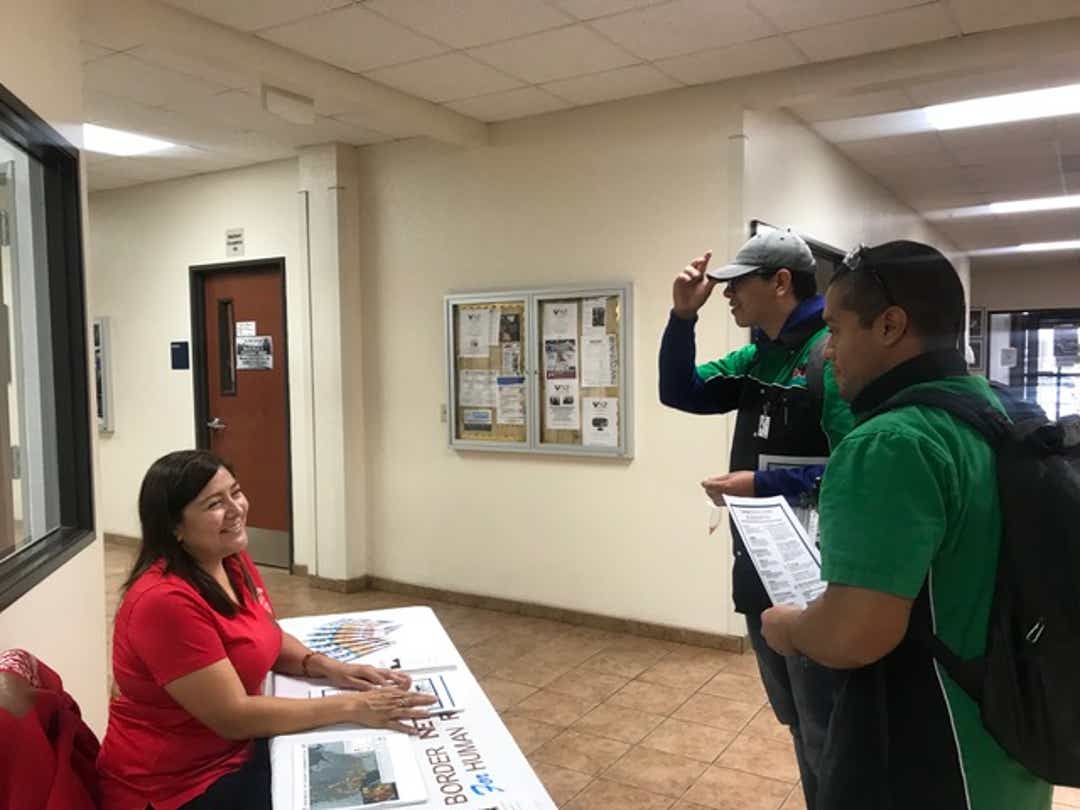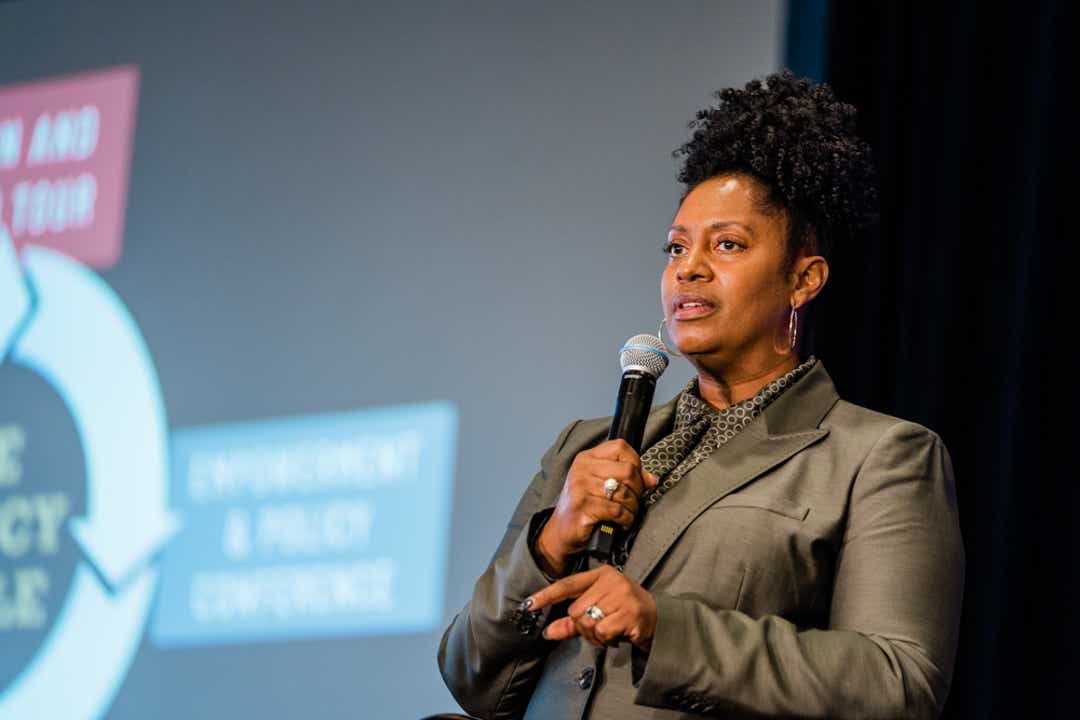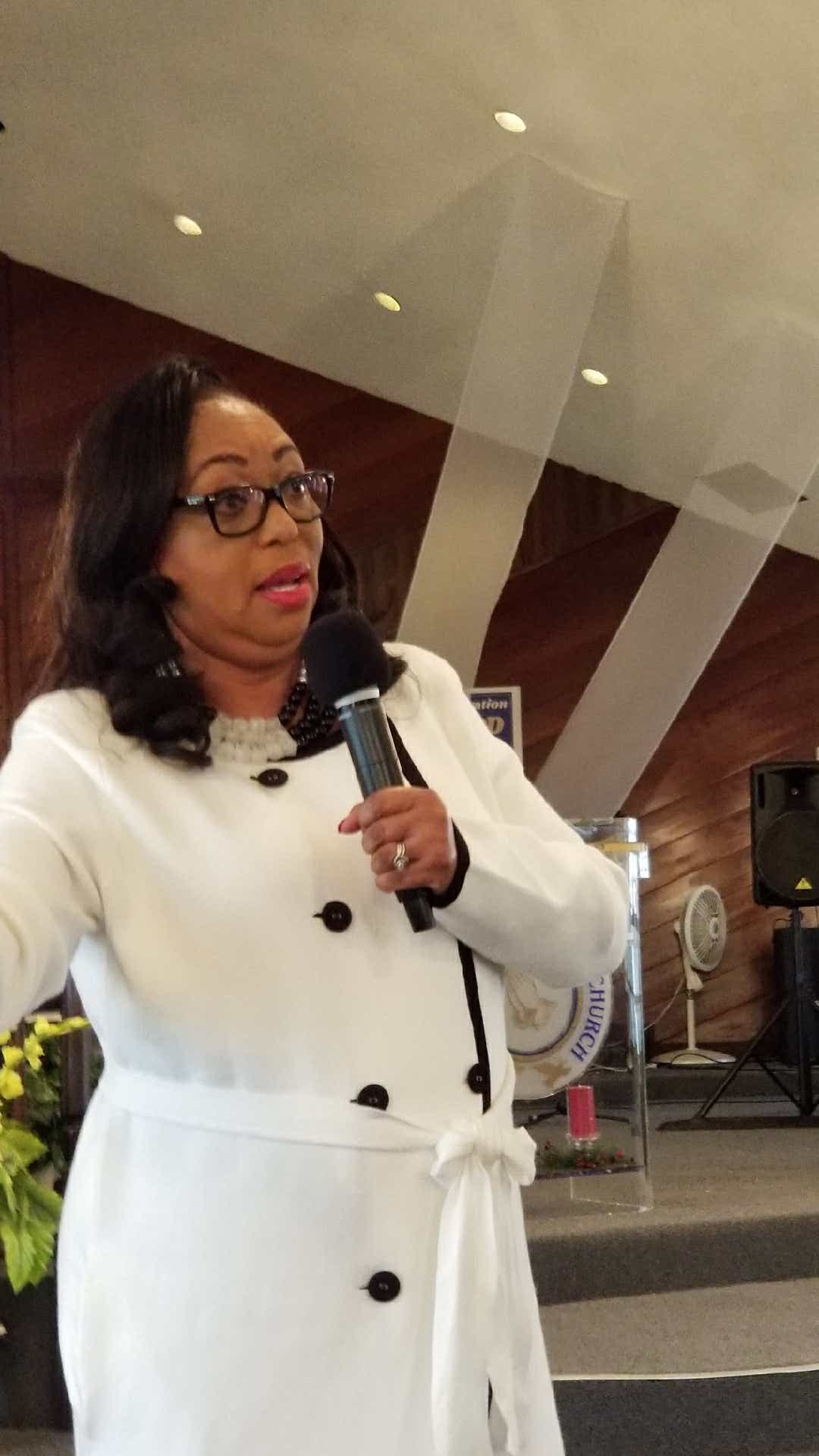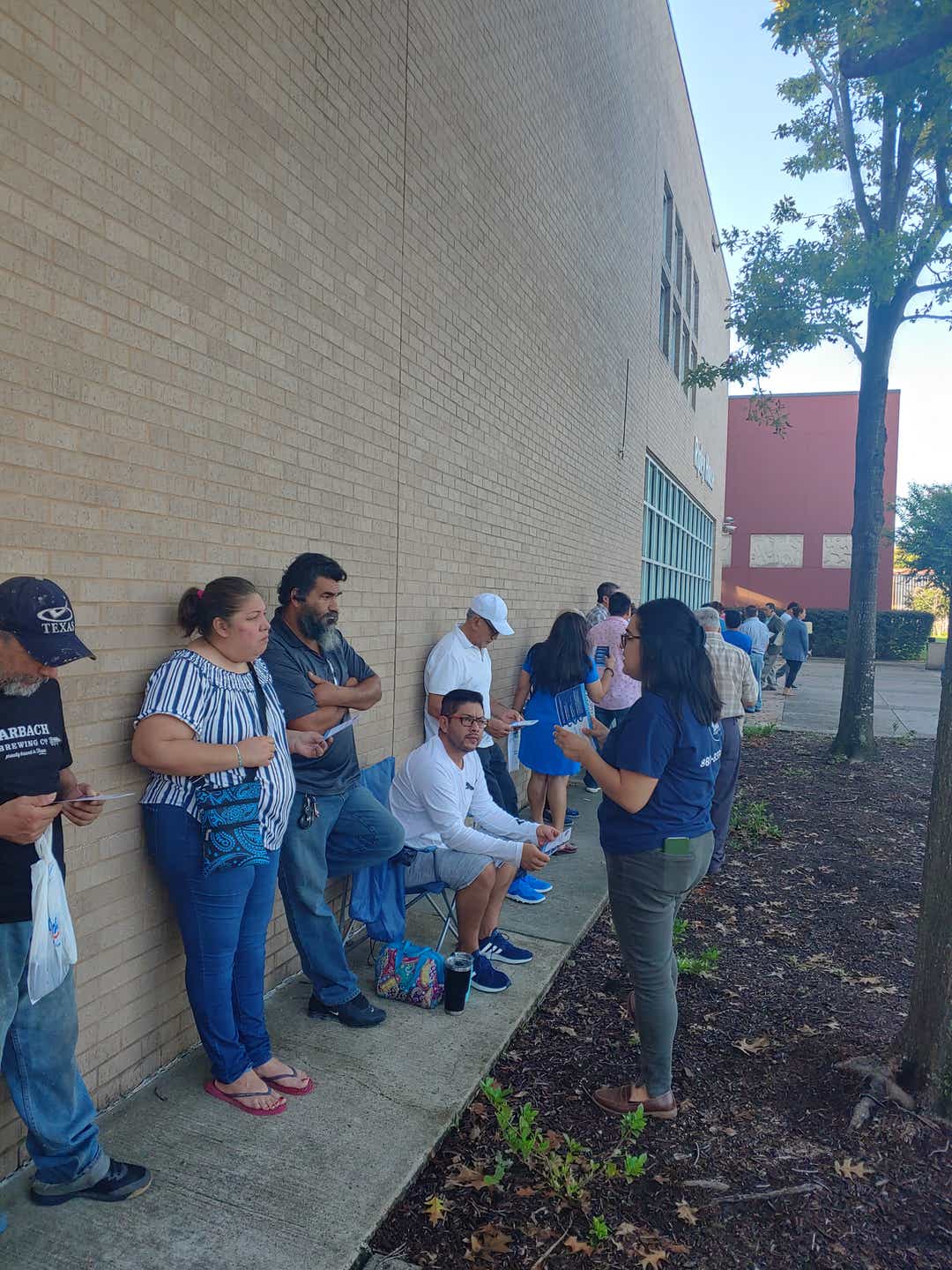Irma Cruz uses her soft voice and reassuring smile to try to persuade Latino residents of El Paso, Texas, to fill out the 2020 census. The civil rights activist explains that being counted as part of the official U.S. population means more money for their families and neighbors, as well as a voice in Congress.
But these days it's a tough sale. Many of those living in the historic Segundo Barrio neighborhood are too busy working to fill out the form, they tell her. Some don't have the language skills to fill out the form, which only is available in English. And many are worried the government might use the information against them.
“I tell them not to worry, their data is protected by federal law, but they still worry,” says Cruz, policy and civic engagement campaign coordinator for the civil rights group, Border Network for Human Rights. “It’s kind of an emergency now. People need to understand how important this is.”

For many communities across the nation, especially people of color and those living in rural areas, the calculus is simple and dire: fill out the 2020 census or risk a historic undercount that could jeopardize everything from a share in $1.5 trillion in federal funding to political representation in Congress.
While historians note that each census count, which happens every 10 years, has its struggles, this one has been rife with challenges, including a global pandemic, a historic recession and interference from President Donald Trump. These include a failed attempt to add a citizenship question to the census, a memorandum calling to exclude unauthorized immigrants from the count and a last-minute directive to speed up the count's completion by four weeks.
Activists see these measures against people of color — folks hit hardest by both COVID-19 illnesses and deaths and by pandemic-fueled unemployment — as an attempt by the administration to hurt Democratic voters. They have filed a number of lawsuits to require a full count of anyone living in the U.S. and extend the census data collection deadline.
"We are in a race against the clock," says Judy Reese Morse, president and CEO of the Urban League of Louisiana in New Orleans. She says her staff is working overtime to “demystify” the census while also explaining that not being counted could have dire effects on schools, community service programs and hospitals.
“We must not let up,” adds Morse. “There is no other option for us.”
Morse and others are hoping their efforts get people to self-report, either by phone or online. Meanwhile, the Census Bureau just days ago started its standard practice of sending representatives into the field to visit so-called Hard to Count households, typically folks located in poor rural and urban areas where the rate of self-reporting is sometimes 20% to 50% lower than fairly typical self-reporting national average of 63%.

At first, this outreach effort, postponed from the spring due to COVID-19, gave volunteers until Oct. 31 to contact these groups. But on Aug. 3, that deadline was moved up to Sept. 30 because, according to the census, that was the only way numbers could be tabulated in time to meet "our statutory deadline of Dec. 31, 2020, as required by law and directed by the Secretary of Commerce."
For its part, the Census Bureau says it is “committed to a complete and accurate 2020 census” despite the accelerated timeline, according to a statement from Bureau director Steven Dillingham.
The statement says the bureau has a “robust field data collection operation,” adding that it plans to add additional training sessions and provide rewards to enumerators — those in the field trying to reach Hard to Count households — “who maximize hours worked.”
The task facing the Bureau's field reporters is daunting: In 2010, census volunteers had 48 million housing units to visit in 10 weeks. This time, it’s 56 million households in just six weeks.
“We are talking about communities that already have low census reporting numbers, and now you add the COVID-19 crisis and the way Latino and Black people are wary about this administration and you have a bad situation,” says Roberto Bustillo, organizing director at Proyecto Pastoral, which focuses on L.A.'s heavily Latino Boyle Heights area. His team of volunteers are feverishly working the phones and hanging fliers on doors to encourage people to fill out the census.

Across the country in Miami, the Rev. Rhonda Thomas normally would have been using churches to spread the word, but because of the health crisis is turning to digital communications and visits to polling stations to push her Black neighbors to be counted.
“Historically, we are a people that has been left out,” says Thomas. “Being counted affects everything, the quality and size of our hospitals, schools, community centers. We need to be included.”
Map shows huge census undercounts in Texas
A review of the Census Bureau's Hard to Count map highlights areas of concern, including the many neighborhoods with heavy Latino and Black populations that have yet to respond.
Texas stands out, with a majority of its counties showing fewer than 50% of residents self-reporting their census information. Edwards County, hard by the Rio Grande River, is at just 14.8%. Other heavily undercounted areas include almost all of New Mexico; California's Central Valley; the southern half of Georgia; and the largely Native American Four Corners region where Colorado, Utah, New Mexico and Arizona meet.
"In 2010, there were undercounts of people of color and Native Americans on reservations, and it seems that now with even more households to visit in less time, the undercount risks being much worse," says Steven Romalewski, who is keeping a close eye on the map as part of the City University of New York’s Center for Urban Research at the Graduate Center. "It's worrisome."
A large census undercount will cast a long shadow, experts say.
“Census numbers hang around for a decade and are used for all sorts of government policy,” says Margo J. Anderson, distinguished professor emerita in history and urban studies at the University of Wisconsin, Milwaukee, and author of “The American Census: A Social History." “So if we don’t think these numbers we get are any good, we’re going to have a very complicated conversation about what to do next.”
Put more bluntly, "if the census is screwed up, it will have dramatic implications for all parts of society," says Andrew Reamer, research professor at George Washington University’s Institute of Public Policy in Washington, D.C. "The census is foundational for democracy, as it affects redistricting, and for the efficient and fair distribution of taxpayer money."
Many civil rights organizations are both pushing hard to get people to fill out the census while also engaging in legal and social action.
“To the outside world, cutting the census short by four weeks might seem like no big deal, but it’s of huge consequence,” says Vanita Gupta, president and CEO of The Leadership Conference on Civil and Human Rights, a Washington, D.C.-based group that has been serving as a clearinghouse for census count activism.
The accelerated deadline threatens to “shortchange people of color as well as low-income people and the homeless of all races. We need to press the Senate to extend the reporting deadline even if it means announcing the results in 2021. We can’t let the pressure off. This has to be done right.”
Groups fight back with lawsuits, outreach
That pressure includes a recent letter signed by 900 national and community organizations urging Senate leaders Mitch McConnell (R-Kentucky) and Chuck Schumer (D-New York) to add a provision to the next COVID-19 relief bill that would give the Census Bureau four more months — until April 2021 — to report its findings.
“The census count isn’t just about political power, but it’s also a tool used by the private sector to decide where to put that next mall or store, real bread and butter stuff that determines where you might be able to shop or work locally,” says Howard Fienberg, co-founder of the Census Project, the nation’s largest census advocacy group, which organized the letter sent to McConnell and Schumer.
Fienberg notes that a big undercount is likely to impact rural areas that already face limited commercial and federal resources, places like Big Horn County, Montana, (population: 13,000), where 82% of the population currently is uncounted by the 2020 census, or Rich County, Utah (1,800), where 88% have yet to respond.
“This is all about letting people know you exist,” he says.
The president has specific ideas of who should be counted in the census.
"Just as we do not give political power to people who are here temporarily, we should not give political power to people who should not be here at all,” Trump said in a July statement explaining his desire to not count undocumented immigrants.
A range of Republican lawmakers, including U.S. Reps. Chip Roy in Texas and Brian Mast in Florida, have applauded the president's efforts. A Pew Research Center study indicates that Florida, Texas and California all stand to lose one congressional seat under Trump's new apportionment plan.
Terry Ao Minnis, senior director of census and voting programs at the civil rights advocacy group Asian Americans Advancing Justice-AAJC, says activist groups are reaching out to Asian Americans to explain the role and importance of the census through social media and other outreach in 15 languages, including Cantonese, Urdu, Tagalog and Bengali.
“We just have to redouble our efforts to tell people that they can and should be counted without fear that their information will be used against them by the government,” says Minnis, whose group filed the amended legal complaint along with the Mexican American Legal Defense and Educational Fund.
“People need to know they can still respond,” she says. “It’s vital.”
Running out of time to count every American
John Thompson, a statistician who directed the Census Bureau until 2017 and oversaw planning for the 2020 census, isn’t confident this count will be accurate simply because of the outsized number of households census workers need to reach during a pandemic in an unusually restricted timeframe.
That could mean a notable redistribution of the 435 seats in the House of Representatives, which could further push the current political landscape in favor of Republicans at a time when issues important to people of color — from police brutality to social equality — are front and center.
“There’s a lot of concern and it goes beyond party lines,” says Thompson. “Myself and other colleagues worry this census will not be suitable for apportionment."

Local activists say they aren’t counting on the Census Bureau officials changing the new Sept. 31 deadline. Instead, they've bolstered their efforts to both boost voter registration and census response rates among people of color.
“We are in a state of emergency,” says Melanie Campbell, president of the National Coalition on Black Civic Participation, which organized a recent strategy call between the organizations. “We have to make sure we don’t lose power.”
The NCBCP and other such groups are pivoting from in-person outreach efforts to social media outreach on Facebook and Twitter. There are also plans to hand out census material at food distribution and COVID-19 testing sites.
One positive sign, some advocates say, is a recent spike in census response rates in places that also have had social justice activities, including protests and rallies in New York and Los Angeles.
That uptick is believed to be “tied to a specific need of the community to figure out ways to be relevant, ways to actually impact the system,” says Austin Patrick, a strategist for Black/African American research for Team Y&R, a communications firm contracted by the census.
Mostly, activists say they are doing whatever they can to “get people to get over the fear and mistrust often associated with filling out the census, maybe now more than ever,” says Edward Hailes, general counsel for the Advancement Project, a Washington, D.C.-based non-profit focusing on racial justice issues.
Hailes says his organization is helping local partners leverage technology and media to promote census self-reporting, through the familiar approach of radio spots and social media messages. But he's feeling the pressure.
"For the government to suddenly say we are going to stop short on collection, that just puts a huge burden on non-profit groups to get the word out especially under COVID-19 restrictions," he says. "But we will do everything we can."
The NALEO Educational Fund, a non-partisan non-profit aimed at boosting Latino civic engagement, also is earmarking funds for targeted media messaging in cities and counties with low self-response rates, such as Yuma, Arizona; Fresno, California; and New York City's Bronx borough.

Lizette Escobedo, director of NALEO’s national census program, says some of NALEO's field officers are finding that even though there is no question on the census about citizenship, its ghost lingers.
“Even though the Supreme Court struck down having a citizenship question on the census, 50% of the people we asked still expect to find that question," she says. "That makes them hesitate.”
In her outreach efforts across Texas, Génesis Sanchez has found that for many Latinos, concerns over health safety and job security join a fear that their information will be used against them.
“I’m very worried, because as Latinos think about their current and future political power, they have to understand that a census undercount will negatively impact that power,” says Sanchez, NALEO’s Texas Regional Census Campaign Manager.
"But we have to keep fighting to the last bit," she says. "All these communities deserve to be fairly represented both financially and politically."
Contributing: Deborah Barfield Berry, USA TODAY
"emergency" - Google News
August 17, 2020 at 09:15AM
https://ift.tt/3iKPnxQ
2020 Census 'emergency' threatens to leave out communities of color and rural Americans - USA TODAY
"emergency" - Google News
https://ift.tt/2VVGGYQ
https://ift.tt/3d7MC6X
emergency
Bagikan Berita Ini















0 Response to "2020 Census 'emergency' threatens to leave out communities of color and rural Americans - USA TODAY"
Post a Comment